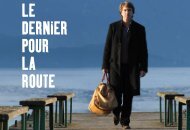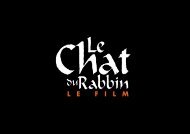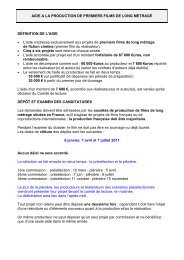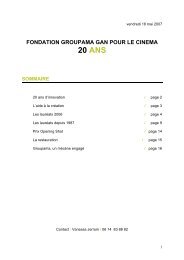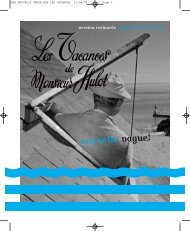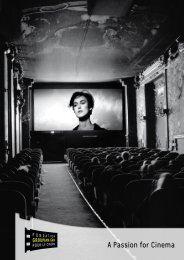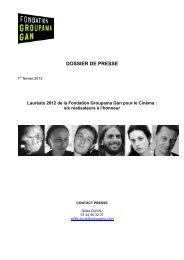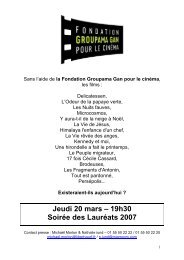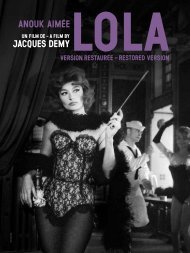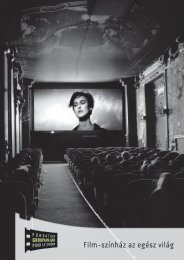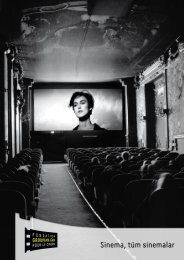Presentation of the project - Fondation Groupama Gan pour le Cinéma
Presentation of the project - Fondation Groupama Gan pour le Cinéma
Presentation of the project - Fondation Groupama Gan pour le Cinéma
You also want an ePaper? Increase the reach of your titles
YUMPU automatically turns print PDFs into web optimized ePapers that Google loves.
SaLaMaNDRa<br />
A film by Pablo Agüero<br />
Technical Information<br />
Working tit<strong>le</strong>: Salamandra<br />
Director: Pablo Agüero<br />
Screenplay by: Pablo Agüero<br />
Nationality: Argentine<br />
Format: 35 mm<br />
Length: 90 mins<br />
Shooting location: Patagonia<br />
Pablo Agüero<br />
Martin Zapata 466<br />
(5500) Mendoza<br />
Argentina<br />
E-mail: surnaif@hotmail.com<br />
SaLaMaNDRa<br />
A film by Pablo Agüero<br />
Director information & filmography<br />
Résidence du Festival<br />
Festival de Cannes<br />
Pablo Agüero, born in 1977, shot all his films in <strong>the</strong> town <strong>of</strong> Patagonia where he grew up.<br />
Más allá de las puertas (directed at age <strong>of</strong> 15). First Price, Bienna<strong>le</strong> <strong>of</strong> Patagonic Art.<br />
Lejos del Sol. Best Short Film, Buenos Aires International Festival. Award <strong>of</strong> <strong>the</strong> Cork Festival.<br />
Primera nieve (adaptation <strong>of</strong> a scene from Salamandra). Now showing in <strong>the</strong> Short Film<br />
Compétition Officiel<strong>le</strong> at <strong>the</strong> Festival de Cannes 2006.<br />
Salamandra received <strong>the</strong> support <strong>of</strong>: Festival d’Amiens, Centre d’Ecritures Cinématographiques,<br />
Casa de América, Festival de Biarritz, Festival de Guadalajara, Produire au Sud and Festival<br />
International de Scénaristes.<br />
3, rue Amélie, F-75007 Paris<br />
Tel. 33 (0) 1 53 59 61 20<br />
Fax 33 (0) 1 53 59 61 24<br />
E-mail:<br />
residence@festival-cannes.fr<br />
www.festival-cannes.org<br />
Since 2000, <strong>the</strong> Festival<br />
Residence provides each year<br />
accommodation and support to<br />
twelve se<strong>le</strong>cted young directors<br />
in order to help <strong>the</strong>m prepare<br />
<strong>the</strong>ir first or second feature film.<br />
A jury presided by a film director<br />
sits twice a year, se<strong>le</strong>cting <strong>the</strong>se<br />
young filmmakers on <strong>the</strong> basis<br />
<strong>of</strong> <strong>the</strong>ir short films, or even first<br />
feature film, and <strong>the</strong> merits <strong>of</strong><br />
<strong>the</strong>ir feature film <strong>project</strong>.<br />
During <strong>the</strong>ir 4-and-a-half-month<br />
stay in Paris, <strong>the</strong>y work on <strong>the</strong><br />
writing <strong>of</strong> <strong>the</strong>ir feature film <strong>project</strong>,<br />
have meetings with pr<strong>of</strong>essionals<br />
and try, with <strong>the</strong> support<br />
<strong>of</strong> <strong>the</strong> Cannes Film Festival, to<br />
bring <strong>the</strong>ir <strong>project</strong> to co-production<br />
status.
Synopsis<br />
Inti is six years old. He is living at his grandmo<strong>the</strong>r’s<br />
when Alba comes back and drags him,<br />
hitch-hiking, to a <strong>le</strong>gendary val<strong>le</strong>y in Patagonia.<br />
In <strong>the</strong> center <strong>of</strong> <strong>the</strong> town, renegades from<br />
four corners <strong>of</strong> <strong>the</strong> world live at <strong>the</strong> late Dr.<br />
Schulz’s, among his equipment, his insect<br />
col<strong>le</strong>ctions and a crowd <strong>of</strong> animals.<br />
Director’s statement<br />
Institutions are dead: God, government,<br />
family, ideology, even <strong>the</strong> hippy illusion.<br />
Tragic is comical, hell is a party, music is<br />
noise, adults are children… And vice versa.<br />
Yet outside, in <strong>the</strong> shantytown, <strong>the</strong> neg<strong>le</strong>cted<br />
children have fun making fire, destroying<br />
an unfinished school building or attacking,<br />
at night, <strong>the</strong> newcomers’ houses.<br />
In <strong>the</strong>se two impossib<strong>le</strong> worlds, Alba tries<br />
to bring up Inti. At any price. Armed with<br />
just her daydreams.<br />
The most typical Argentinean gaucho – <strong>the</strong><br />
one who picks up all <strong>the</strong> hitch-hikers in his<br />
tractor to which two lambs are attached, <strong>the</strong><br />
one who sings tango using wine bott<strong>le</strong>s as<br />
pipes – is an English drug dea<strong>le</strong>r who chews<br />
pieces <strong>of</strong> glass to seduce teenagers.<br />
My town is a land <strong>of</strong> fugitives: <strong>of</strong> beautiful<br />
monsters, cosmopolitan and disoriented,<br />
clinging onto <strong>the</strong>ir reveries. For <strong>the</strong>m, just like<br />
for blind peop<strong>le</strong>, sound flourishes and <strong>the</strong><br />
most important sense is touch. By touching,<br />
<strong>the</strong>y feel <strong>the</strong>ir way around, but more than<br />
that, <strong>the</strong>y feel “touched”: invasive rain,<br />
tadpo<strong>le</strong>s in <strong>the</strong> pudd<strong>le</strong>s, insects in <strong>the</strong> food,<br />
steaming blood <strong>of</strong> lambs, melted wax from<br />
cand<strong>le</strong>s, beds covered with bread dough…<br />
Synopsis<br />
Inti a six ans. Il vit chez sa grand-mère<br />
lorsque Alba revient et <strong>le</strong> traîne en auto-stop<br />
jusqu’à une vallée mythique de la Patagonie.<br />
Au centre du village, des renégats des quatre<br />
coins du monde vivent chez <strong>le</strong> défunt<br />
Dr Schulz, entre ses instruments, ses col<strong>le</strong>ctions<br />
d’insectes et une fou<strong>le</strong> d’animaux.<br />
Note d’intention<br />
Toute institution est révolue : Dieu, l’état, la<br />
famil<strong>le</strong>, l’idéologie, même l’illusion hippie. Le<br />
tragique est comique, l’enfer est une fête, la<br />
musique est un bruit, <strong>le</strong>s adultes sont des<br />
enfants… Et vice-versa.<br />
Aux a<strong>le</strong>ntours, dans <strong>le</strong> bidonvil<strong>le</strong>, des enfants<br />
délaissés jouent à faire du feu, à démolir<br />
une éco<strong>le</strong> en construction ou à attaquer, la<br />
nuit, <strong>le</strong>s maisons des nouveaux venus.<br />
Dans ces deux mondes impossib<strong>le</strong>s, Alba<br />
tente d’é<strong>le</strong>ver Inti. À tout prix. Armée<br />
seu<strong>le</strong>ment de sa rêverie.<br />
Le plus typique gaucho argentin – celui qui<br />
prend <strong>le</strong>s auto-stoppeurs sur son tracteur<br />
avec deux agneaux attachés et qui chante du<br />
tango avec une bouteil<strong>le</strong> de vin en guise de<br />
flûte de pan – est un dea<strong>le</strong>r anglais qui<br />
mâche du verre <strong>pour</strong> séduire des pubères.<br />
Mon village est une terre de fugitifs.<br />
De beaux monstres, cosmopolites et déboussolés,<br />
agrippés à <strong>le</strong>urs délires. Pour eux,<br />
comme <strong>pour</strong> <strong>le</strong>s aveug<strong>le</strong>s, l’espace sonore<br />
est surchargé et <strong>le</strong> toucher devient un sens<br />
privilégié. Ils tâtent, mais surtout, ils sont<br />
« touchés » : pluie envahissante, têtards dans<br />
<strong>le</strong>s flaques, insectes dans la nourriture, sang<br />
vaporeux des agneaux, cire fondue des<br />
bougies, lits enduits de pâte à pain…



